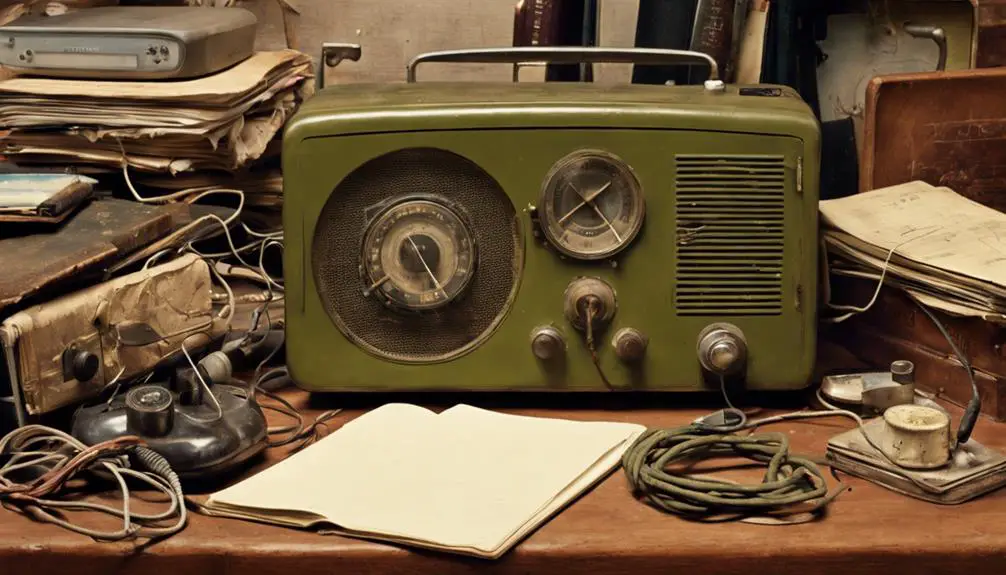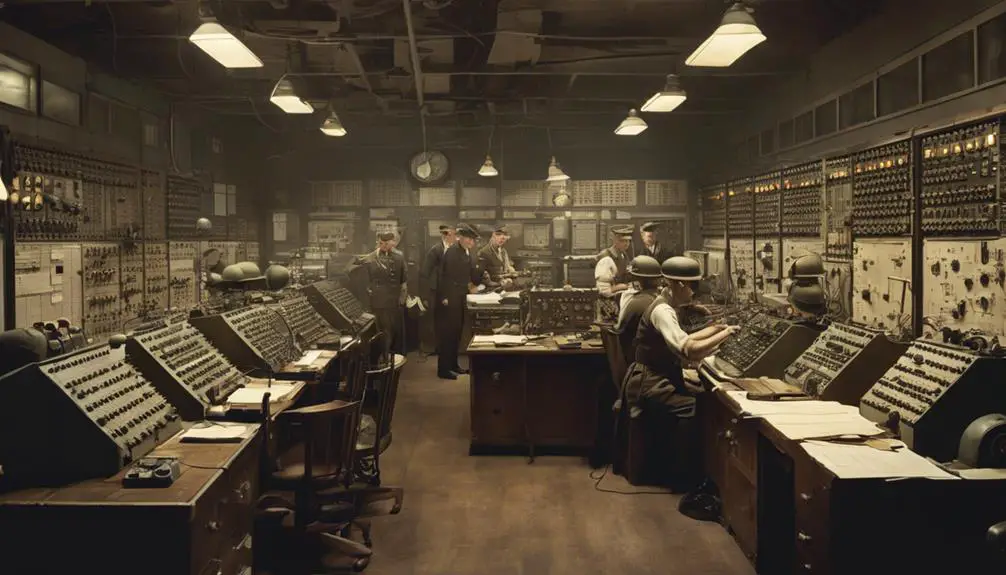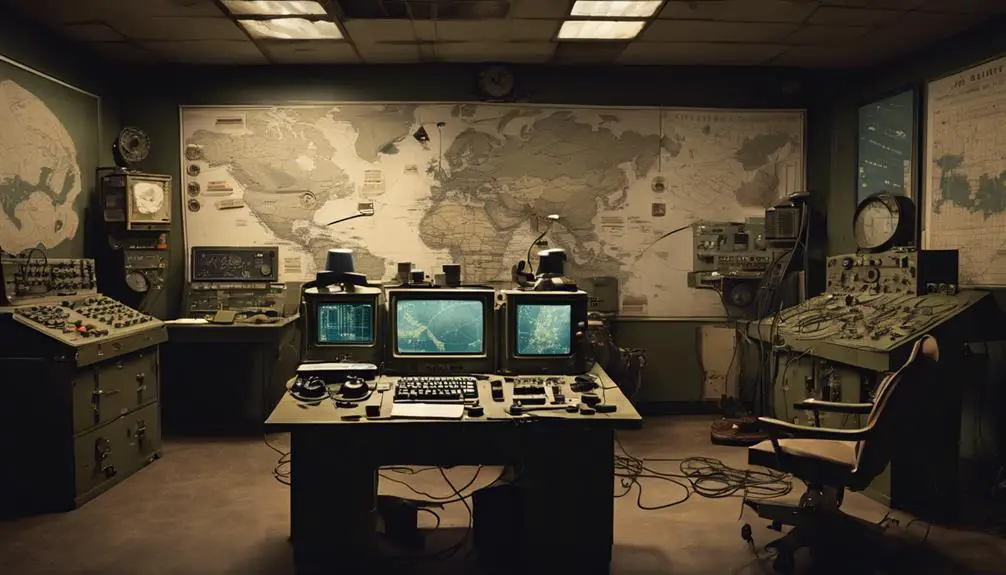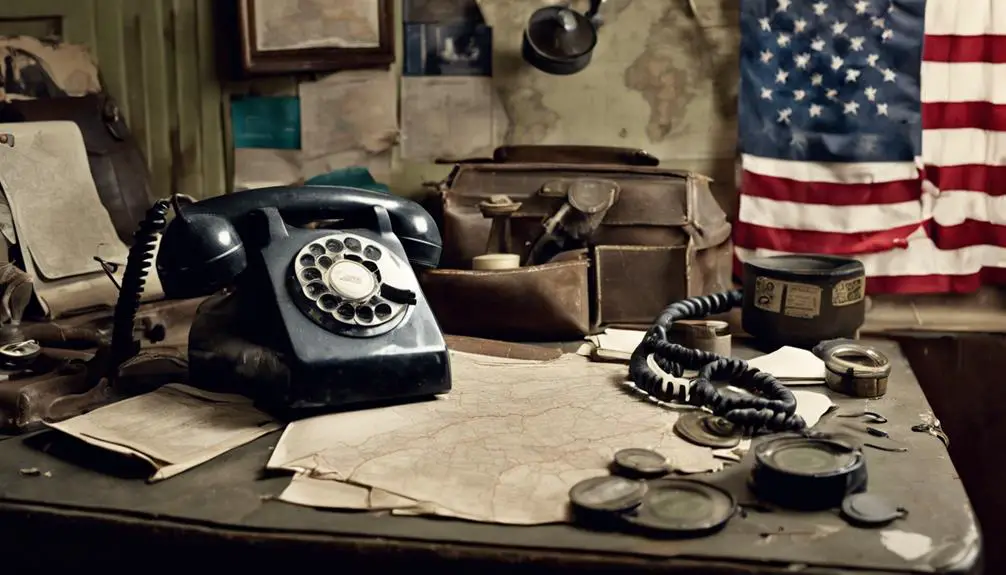You're diving into the world of landline military slang, which originated from the early days of military telecommunications. Morse code and teleprinters enabled efficient communication, giving rise to a unique vocabulary. This specialized language was designed for quick and accurate information exchange in high-stress situations. Landline lingo relied heavily on codes and ciphers, with operators facilitating secure communication between personnel. From phone and field communications to audio and acoustic signals, each component played a significant role in ensuring operational secrecy. As you explore this world, you'll discover the intricacies of military communication and its importance in critical operations.
Origins of Landline Lingo

Tracing the roots of landline lingo, you'll find that its origins date back to the early days of military telecommunications, when operators relied on Morse code and teleprinters to convey critical information over wired connections. During World War I, military personnel developed a unique vocabulary to facilitate quick and accurate communication over telegraph lines. This etymology history reveals that military jargon emerged as a response to the need for concise and efficient communication in high-stress situations.
The early 20th century saw the widespread adoption of teleprinters, which enabled rapid transmission of messages over wires. Military operators developed a distinct language, comprising abbreviations, acronyms, and colloquialisms, to expedite communication. This specialized vocabulary allowed operators to convey complex information quickly and accurately, often under extreme pressure.
As military telecommunications evolved, so did the language. New terms and phrases emerged, reflecting the changing nature of military operations and technological advancements. The origins of landline lingo showcase the resourcefulness and ingenuity of military personnel, who developed a unique language to meet the demands of wartime communication.
Communication Codes and Ciphers
As you navigate the complex landscape of military communication, you'll discover that landline lingo relied heavily on codes and ciphers to protect sensitive information from enemy interception.
To guarantee secure transmission, military forces employed various cryptoanalysis techniques to encrypt signals. Signal encryption involved converting plaintext messages into unreadable ciphertext, making it difficult for unauthorized parties to decipher the information. This process utilized complex algorithms and keys to scramble the data, rendering it inaccessible to unauthorized recipients.
In the domain of military communication, signal encryption played an essential role in safeguarding classified information. By using advanced cryptoanalysis techniques, military personnel could encode messages in a way that made them virtually unbreakable.
This added an extra layer of security to landline communication, allowing troops to coordinate strategies and exchange vital information without compromising operational secrecy.
As you explore further into the world of landline military slang, you'll uncover the intricate methods used to protect sensitive information and appreciate the significance of communication codes and ciphers in military operations.
Operator Assistance and Switchboards

How did military operators assist in connecting important calls, and what switchboard procedures guaranteed seamless communication across the landline network? As you explore the world of landline military slang, you'll discover that operators played a vital role in facilitating communication between military personnel. They were the unsung heroes behind the scenes, ensuring that calls were connected efficiently and securely.
Switchboard security was essential, and operators adhered to strict protocols to prevent unauthorized access. They verified caller identities, used secure lines, and employed encryption methods to safeguard sensitive information. Operator etiquette was also critical, as they maintained a professional demeanor, remained composed under pressure, and followed established procedures to handle high-priority calls.
In switchboards, operators worked in tandem to manage call traffic, prioritize connections, and troubleshoot issues. They utilized specialized equipment, such as switchboards and patch cords, to direct calls to their intended recipients.
Phones and Field Communications
You're about to explore that phones and field communications played a pivotal role in extending the landline network's reach, allowing military personnel to stay connected even in the most remote or hostile environments. This was achieved through the deployment of wireless networks, which enabled secure and reliable communication in areas where traditional landlines were impractical or impossible. These wireless networks were often backed up by satellite links, providing an additional layer of redundancy and making sure that critical communications remained uninterrupted.
In the field, communication equipment was designed to be rugged, portable, and easy to use, even in the most challenging conditions. Phones and radios were built to withstand extreme temperatures, humidity, and physical stress, making them ideal for deployment in combat zones. Additionally, advanced encryption and secure protocols ensured that sensitive information remained protected from interception or eavesdropping.
As you explore further into the world of landline military slang, you'll realize that phones and field communications were instrumental in facilitating seamless communication, coordination, and command and control – all critical components of successful military operations.
Audio and Acoustic Signals

In the domain of military communication, audio and acoustic signals played a vital role in conveying critical information, from tactical commands to situational awareness, through a range of devices and systems. As you explore the world of military communication, you'll find that audio signals were transmitted through wired and wireless networks, enabling secure transmission of voice and data. Acoustic signals, on the other hand, relied on sound waves to convey information, often in environments where radio communication was compromised.
| Signal Type | Description | Applications |
|---|---|---|
| Audio Signals | Transmitted through wired/wireless networks | Secure voice and data transmission |
| Acoustic Signals | Rely on sound waves for transmission | Underwater communication, covert ops |
| Audio Frequency | Used for voice transmission | Radio communication, phone calls |
| Acoustic Stealth | Minimizes signal detection | Covert operations, surveillance |
You'll notice that signal strength and acoustic stealth were pivotal factors in military communication. Signal strength determined the reliability of transmission, while acoustic stealth ensured that signals remained undetected by the enemy. By understanding the nuances of audio and acoustic signals, you'll gain insight into the complexities of military communication.
Phonetics and Radio Protocol
Effective radio communication relies on a standardized phonetics system, where military personnel use a specific alphabet to clearly convey letters and numbers over radio transmissions.
You'll use this phonetics system to prevent misunderstandings, guaranteeing accurate communication in high-stress situations. For instance, you'll use 'Alpha' for the letter 'A', 'Bravo' for 'B', and so on. This standardized system helps avoid confusion between similar-sounding letters or numbers.
When communicating over radio, you'll also need to follow radio etiquette guidelines. This includes using proper call signs, identifying yourself clearly, and maintaining a professional tone. Pay attention to your voice inflections, as they can convey emotions and attitudes.
A calm, steady tone is essential for effective communication. Remember to speak clearly, avoiding mumbling or shouting, and adjust your volume according to the situation.
By following these guidelines, you'll guarantee that your messages are conveyed accurately and efficiently, even in high-pressure situations.
Frequently Asked Questions
Is Landline Military Slang Still Used in Modern Warfare?
As you examine modern warfare, you'll find that combat readiness is vital.
The tactical evolution of military operations has led to a shift towards advanced communication systems.
While landline military slang was once essential, it's now largely replaced by more secure and efficient communication methods.
You'll rarely hear traditional radio calls in modern combat zones, as digital platforms have taken precedence, ensuring seamless coordination and enhanced situational awareness.
Can Civilians Use Landline Military Slang in Everyday Life?
As you navigate the complexities of social norms and workplace etiquette, you might wonder: can you borrow from the military's linguistic playbook?
In reality, using military slang in everyday life can be a double-edged sword. While it may add a hint of rugged charm, it can also come across as out of place or even pretentious.
Are There Any Landline Military Slang Terms Still Classified?
As you explore the world of classified information, you'll find that certain terms remain shrouded in secrecy.
It's likely that some military slang terms, particularly those related to codes and cryptography, are still classified. These top-secret terminology and codes are restricted to safeguard national security, and you won't find them in any public dictionary.
You might stumble upon declassified terms, but the most sensitive information remains hidden from public eyes.
Can Landline Military Slang Be Used for Encryption Purposes?
Can you imagine using a language system as a cipher? That's exactly what you're asking when considering using landline military slang for encryption purposes.
In theory, it's possible to leverage the cipher potential of this unique language to conceal sensitive information. However, code redundancy becomes a significant issue, as the slang's limited vocabulary and structure could make it vulnerable to decryption.
Are There Any Books That Document Landline Military Slang History?
When exploring the history of specialized slang, you'll likely find that archival research and historical analysis are essential in uncovering its roots.
In the case of landline military slang, you might be wondering if there are any books that document its history. While there may not be a single all-encompassing book on the subject, you can find scattered references in military histories and linguistic studies that provide valuable insights into its evolution.
Conclusion
You've mastered the military's secret language of landline lingo! You can decipher cryptic codes, navigate switchboards like a pro, and decode phonetic alphabets with ease.
Your ears can pick up the faintest audio signals, and you can rattle off radio protocols like a seasoned vet. You're the ultimate communications wizard, capable of conjuring up entire conversations from thin air.
Your skills are so sharp, you can practically hear the enemy's plans before they even whisper them!







